Theology
Equal of the Apostles Great Prince Vladimir, in Holy Baptism Basil, the Enlightener of the Russian Land
28. July 2018 - 21:11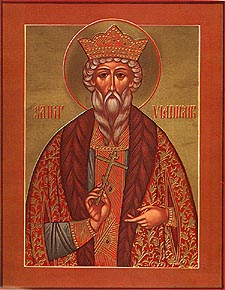 The Holy Great Prince Vladimir, Equal of the Apostles. Few names in the annals of history can compare in significance with the name of Saint Vladimir, the Baptizer of Rus, who stands at the beginning of the spiritual destiny of the Russian Church and the Russian Orthodox people. Vladimir was the grandson of Saint Olga, and he was the son of Svyatoslav (+ 972). His mother, Malusha (+ 1001) was the daughter of Malk Liubechanin, whom historians identify with Mal, prince of the Drevlyani. Having subdued an uprising of the Drevlyani and conquered their cities, Princess Olga gave orders to execute Prince Mal for his attempt to marry her after he murdered her husband Igor, and she took to herself Mal’s children, Dobrynya and Malusha. Dobrynya grew up to be a valiant brave warrior, endowed with a mind for state affairs, and he was later on an excellent help to his nephew Vladimir in matters of military and state administration.
The Holy Great Prince Vladimir, Equal of the Apostles. Few names in the annals of history can compare in significance with the name of Saint Vladimir, the Baptizer of Rus, who stands at the beginning of the spiritual destiny of the Russian Church and the Russian Orthodox people. Vladimir was the grandson of Saint Olga, and he was the son of Svyatoslav (+ 972). His mother, Malusha (+ 1001) was the daughter of Malk Liubechanin, whom historians identify with Mal, prince of the Drevlyani. Having subdued an uprising of the Drevlyani and conquered their cities, Princess Olga gave orders to execute Prince Mal for his attempt to marry her after he murdered her husband Igor, and she took to herself Mal’s children, Dobrynya and Malusha. Dobrynya grew up to be a valiant brave warrior, endowed with a mind for state affairs, and he was later on an excellent help to his nephew Vladimir in matters of military and state administration.
Sts. Cyricus and Julita the Martyrs of Tarsus
28. July 2018 - 21:08 The Holy Martyrs Cyricus and Julitta lived in the city of Iconium in the province of Lykaoneia in Asia Minor. St Julitta was descended from an illustrious family and was a Christian. Widowed early on, she raised her three-year old-son Cyricus (Quiricus). During the emperor Diocletian's persecution of Christians, St Julitta departed the city with her son and two trustworthy servants, leaving behind her home, property, and servants.Concealing her noble rank, she hid out first at Seleucia, and then at Tarsus. There around the year 305 she was recognized, arrested and brought to trial before the governor, Alexander. Strengthened by the Lord, she fearlessly answered the judge's questions, and firmly confessed her faith in Christ.
The Holy Martyrs Cyricus and Julitta lived in the city of Iconium in the province of Lykaoneia in Asia Minor. St Julitta was descended from an illustrious family and was a Christian. Widowed early on, she raised her three-year old-son Cyricus (Quiricus). During the emperor Diocletian's persecution of Christians, St Julitta departed the city with her son and two trustworthy servants, leaving behind her home, property, and servants.Concealing her noble rank, she hid out first at Seleucia, and then at Tarsus. There around the year 305 she was recognized, arrested and brought to trial before the governor, Alexander. Strengthened by the Lord, she fearlessly answered the judge's questions, and firmly confessed her faith in Christ.
The Priestly-martyr Pancratius [Pancras] The bishop of Taormina
22. July 2018 - 8:52This saint was born in Antioch during the time when the Lord Jesus Christ walked as a man among men on earth.
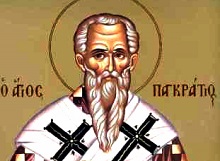 Hearing about the miracles of Christ, the parents of Pancratius desired to see the Lord, the miracle-worker. Together with Pancratius, they traveled to Jerusalem where they saw Jesus, heard His words and witnessed His miracles. It was in Jerusalem that Pancratius became acquainted with the Apostle Peter. After the Ascension of the Lord, both parents and Pancratius were baptized in Antioch. Pancratius withdrew to a cave in Pontus where the Apostle Peter found him and in agreement with the Apostle Paul he was appointed as the Bishop of Taormina in Sicily. In Taormina, St. Pancratius worked many miracles, destroyed the idols, baptized the unbaptized, strengthened the baptized and governed well the Church of God.
Hearing about the miracles of Christ, the parents of Pancratius desired to see the Lord, the miracle-worker. Together with Pancratius, they traveled to Jerusalem where they saw Jesus, heard His words and witnessed His miracles. It was in Jerusalem that Pancratius became acquainted with the Apostle Peter. After the Ascension of the Lord, both parents and Pancratius were baptized in Antioch. Pancratius withdrew to a cave in Pontus where the Apostle Peter found him and in agreement with the Apostle Paul he was appointed as the Bishop of Taormina in Sicily. In Taormina, St. Pancratius worked many miracles, destroyed the idols, baptized the unbaptized, strengthened the baptized and governed well the Church of God.
St. Great-Martyr Procopius
21. July 2018 - 14:24Procopius was born in Jerusalem of a father who was a Christian and a mother who was a pagan. At first, his name was Neanias.
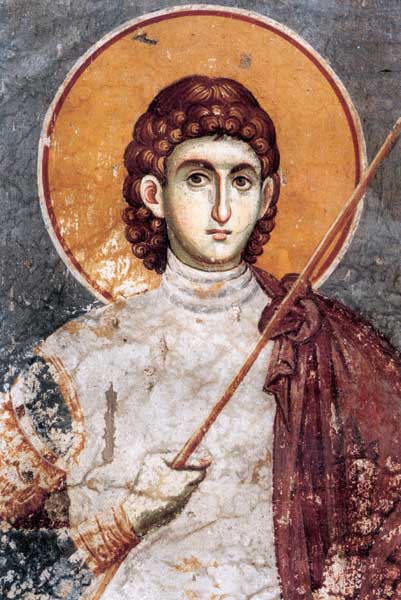 Following the death of his father, the mother raised her son completely in the spirit of Roman idolatry. When Neanias matured, Emperor Diocletian saw him and, at once, took a liking to him and brought him to his palace for military service. When this nefarious emperor began to persecute Christians, he ordered Neanias to go to Alexandria with a garrison of soldiers and there to exterminate the Christians. But, on the road, something happened to Neanias similar to that which happened to Saul [Paul]. In the third hour of the night there was a strong earthquake and, at that moment, the Lord appeared to him and a voice was heard: "Neanias, where are you going and against whom are you rising up?" In great fear, Neanias asked: "Who are You Lord? I am unable to recognize You." At that moment, a glowing cross as if of crystal appeared in the air and from the cross there came a voice saying: "I am Jesus, the crucified Son of God."
Following the death of his father, the mother raised her son completely in the spirit of Roman idolatry. When Neanias matured, Emperor Diocletian saw him and, at once, took a liking to him and brought him to his palace for military service. When this nefarious emperor began to persecute Christians, he ordered Neanias to go to Alexandria with a garrison of soldiers and there to exterminate the Christians. But, on the road, something happened to Neanias similar to that which happened to Saul [Paul]. In the third hour of the night there was a strong earthquake and, at that moment, the Lord appeared to him and a voice was heard: "Neanias, where are you going and against whom are you rising up?" In great fear, Neanias asked: "Who are You Lord? I am unable to recognize You." At that moment, a glowing cross as if of crystal appeared in the air and from the cross there came a voice saying: "I am Jesus, the crucified Son of God."
Martyr Kyriake of Nicomedia
20. July 2018 - 10:26Saint Kyriake was the only child of Dorotheus and Eusebia. Since she was born on a Sunday (Kyriake, in Greek), she was named Kyriake.
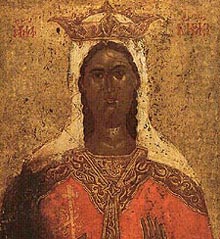 One day a wealthy magistrate wished to betroth Kyriake to his son. Not only was she young and beautiful, but her parents were wealthy, and the magistrate wished to control that wealth. The magistrate went to her parents to request her hand, but Saint Kyriake told him that she wished to remain a virgin, for she had dedicated herself to Christ.
One day a wealthy magistrate wished to betroth Kyriake to his son. Not only was she young and beautiful, but her parents were wealthy, and the magistrate wished to control that wealth. The magistrate went to her parents to request her hand, but Saint Kyriake told him that she wished to remain a virgin, for she had dedicated herself to Christ.
The magistrate was angered by her words, so he went to the emperor Diocletian to denounce the saint and her parents as Christians who mocked the idols, and refused to offer sacrifice to them.
Diocletian sent soldiers to arrest the family and have them brought before him. He asked them why they would not honor the gods which he himself honored. They told him that these were false gods, and that Christ was the one true God.
The Placing of the Honorable Robe of the Most Holy Mother of God at Blachernae
14. July 2018 - 23:08The Placing of the Venerable Robe of the Most Holy Theotokos at Blachernae: During the reign of the Byzantine Emperor Leo the Great (457-474), the brothers Galbius and Candidus, associates of the emperor, set out from Constantinople to Palestine to venerate the holy places.
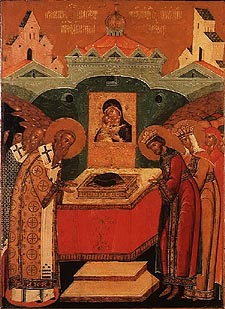 In a small settlement near Nazareth they stayed in the home of a certain old Jewish woman. In her house they noticed a room where many lamps were lit, incense burned, and sick people were gathered. When they asked her what the room contained, the pious woman did not want to give an answer for a long time. After persistent requests, she said that she had a very precious sacred item: the Robe of the Mother of God, which performed many miracles and healings. Before Her Dormition the Most Holy Virgin bequeathed one of her garments to a pious Jewish maiden, an ancestor of the old woman, instructing her to leave it to another virgin after her death. Thus, the Robe of the Mother of God was preserved in this family from generation to generation.
In a small settlement near Nazareth they stayed in the home of a certain old Jewish woman. In her house they noticed a room where many lamps were lit, incense burned, and sick people were gathered. When they asked her what the room contained, the pious woman did not want to give an answer for a long time. After persistent requests, she said that she had a very precious sacred item: the Robe of the Mother of God, which performed many miracles and healings. Before Her Dormition the Most Holy Virgin bequeathed one of her garments to a pious Jewish maiden, an ancestor of the old woman, instructing her to leave it to another virgin after her death. Thus, the Robe of the Mother of God was preserved in this family from generation to generation.

